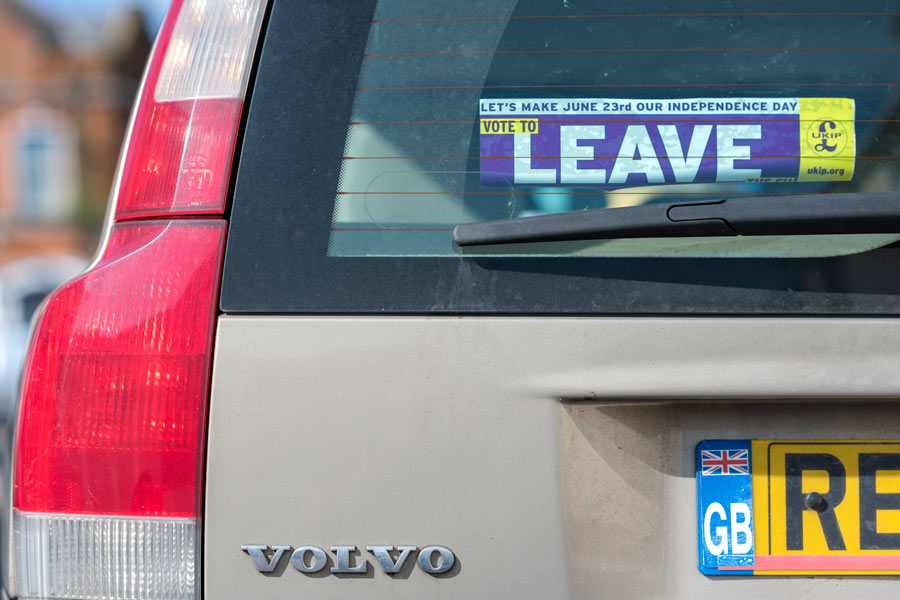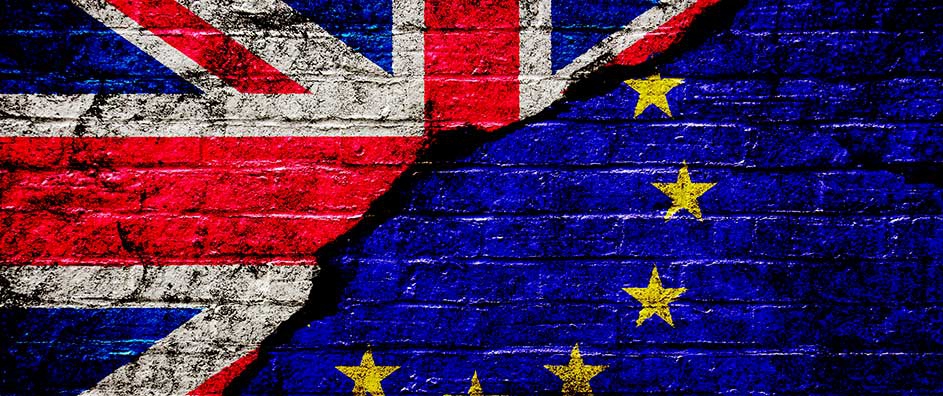The views expressed in our content reflect individual perspectives and do not represent the authoritative views of the Baha'i Faith.
xen·o·pho·bi·a: n. [Greek xenos, foreign + phobia] fear or hatred of strangers or foreigners.
Great Britain’s now-pending exit from the European Union has produced a huge flood of public opinion and outcry. In this short series of essays, though, we’ll step back from the immediate political and economic consequences to take a look at the broader concepts behind that Union; examine the underlying causes of such a headline-generating international break-up; and search for the global ramifications over the long term.
For those who haven’t followed the development of the European Union—what Winston Churchill famously called “The United States of Europe”—here’s a brief glance at the historical facts. The extreme, virulent and catastrophic nationalism, xenophobia and genocide of World War II convinced the postwar leaders of Europe that a united confederation of the continent’s nations would help stop the future devastation another war would wreak on European civilization. Longtime enemies France and Germany led the way. Toward that end, in 1948 the Hague Congress formed the “EMI”—the European Movement International—the first predecessor to the EU. After entering into a series of intermediate labor and trade-related treaties, the nations of Belgium, France, Italy, Luxembourg, the Netherlands and West Germany signed the Treaty of Rome in 1957, which created the European Economic Community (EEC). Sixteen years later in 1973, the original six founding countries of the EEC were joined by Denmark, Ireland and the United Kingdom. By the time of the creation of The European Union itself, formally established in 1993 by the Maastricht Treaty, fifteen countries had become official members. Their vision: a united European federation, without the old borders and the old hatreds, designed, in the words of one founding member, to “make war unthinkable and materially impossible.”
Now, though, the UK has voted to leave the EU.
Many factors—economic, political and social—converged to make the so-called “Brexit” vote possible in the United Kingdom. Analysts, pollsters and scholars from many different parts of the political spectrum, however, have identified one single major determinant in the narrow victory for the “Leave” campaign: immigration.

To understand how immigration policy has managed to have such an impact on the UK’s voters, let’s review. Prior to the EU’s establishment in 1993, net in-migration to Great Britain remained historically quite minimal, with less than 100,000 people annually entering a country of more than 50 million. The UK’s highly restrictive immigration policies kept that number very low.
But the EU changed things. Beginning in 1993, when the EU’s rules went into effect, membership in the European Union meant that member states could not bar immigration from other member states, as they had in the past. Instead of a collection of completely sovereign countries with their own borders and varying immigration policies, the EU really did take Churchill’s advice and make European countries more like the federated states in the United States—at least where trade, the economy and migration were concerned. With one EU passport and no major border restrictions, EU citizens could move across nations just as readily as Americans could move from Alabama to California.
As a result, Oxford University researchers found, the foreign-born population of the UK expanded rapidly, growing from 3.8 million in 1993 to 8.3 million in 2014. Not all of that in-migration came from other EU nations—in fact, most came from India and Pakistan, traditionally the UK’s largest cohort of foreign-born citizens. Also, the post-communist expansion of the EU by “accessioning” former Eastern Bloc nations resulted in many poor migrants landing in England, Northern Ireland and Scotland. Poland, for example, quickly became the second-largest source of UK in-migration.
As a result, British society began to look much more diverse, and public sentiment in some quarters began to turn. Those factors and the 2008 global recession soon produced a parochial, anti-immigrant mood in the UK, which then became increasingly xenophobic. In the past two decades, levels of British concern about “immigration and race relations” has soared from barely registering on any public poll to approximately 45 percent. Large, growing voting populations in not only the UK but in other EU countries like France and Germany starting demanding lower immigration levels, along with less “control” from the EU government in Brussels. Anti-immigrant political demagogues in western nations, including many outside the EU, have drawn increasing numbers of votes by promising to keep immigrants out. As immigration grows, it seems, so does the backlash.
This kind of xenophobia and anti-immigrant prejudice, especially when exploited by ambitious and unscrupulous politicians, can result in national referendums like the Brexit vote. Think about it: a majority of UK citizens actually voted to risk economic insecurity and recession to stop immigration.
Baha’is believe that this kind of unthinking prejudice and fear—the very definition of xenophobia—has no place in the modern world. The Baha’i teachings call for an end to all xenophobia, nativism, foreignness and fear:
O peoples of the world! The Sun of Truth hath risen to illumine the whole earth, and to spiritualize the community of man. Laudable are the results and the fruits thereof, abundant the holy evidences deriving from this grace. This is mercy unalloyed and purest bounty; it is light for the world and all its peoples; it is harmony and fellowship, and love and solidarity; indeed it is compassion and unity, and the end of foreignness; it is the being at one, in complete dignity and freedom, with all on earth. – Abdu’l-Baha, Selections from the Writings of Abdu’l-Baha, p. 1.
In light of this fundamental, bedrock Baha’i principle, let’s dedicate the upcoming essays in this series to exploring what it would take, given the xenophobia and prejudice so rampant in today’s societies, to truly “spiritualize the community of man.”
Next: Globalization: Welcome to the New World Order
You May Also Like
Comments

















You say: "Analysts, pollsters and scholars from many different parts of the political spectrum, however, have identified one single major determinant in the narrow victory for the “Leave” campaign: immigration." That is actually not the whole truth - by a ...long way, as many of the comments already shared in response to your article attest. There were many issues which contributed towards the Leave vote, including: poverty and deprivation in the UK (people were promised that a large sum of money which was supposedly sent to the EU every week - £350 million, would now be re-channeled to them in the UK, e.g. for the NHS - it has later transpired that that was a lie/propaganda by the Leave side), the wish to take back control of our own laws and regulations (some politicians have constantly told us that we need more control, failing to describe the assistance and protection the EU also affords us), propaganda that our country's problems are caused by immigrants and the EU (which is supposedly comprised of over-paid, ineffectual, corrupt and lazy officials - which of course our ruling classes are not), people's lack of trust in politicians and anger at the political establishment (which has a long history here), the corruption and oppression of the ruling classes (the two main political leaders campaigned for Remain, and some decided to vote Leave as a protest vote against them, what they and the system are seen to represent).
There is inequality, poverty and unhappiness in the UK. The disadvantaged struggle and rely on food banks to survive. Certain politicians and the media have exploited this by playing on people's anger at social deprivation and turning it on others. This is oligarchy in action - blame anyone other than yourselves, divide and rule, so that the rich, powerful and privileged continue to maintain their positions at the top of the pile, while others live in deprivation and misery. Instead of addressing poverty, inequality and oppression, they prefer to blame immigrants, refugees and the EU - those were strong themes of the campaign, which your article fails to mention. They succeeded in harnessing people's anger about social injustice in the UK and re-directing it at immigrants and the EU. The UK has certainly not always had such a xenophobic atmosphere as it does currently. In fact the opposite - unity in diversity - has often prevailed before this divisive and destructive campaign and result. That is why people are now shocked and angry at the racism and xenophobia which the campaign has stirred up and legitimised. Yes we have always had racism here, but it has increased due to divisive political campaigning and the media.
Many people, not just in the UK but worldwide, are angry, sick and tired of the oppression and injustice of the ruling classes, so the vote to leave could be understood from that perspective too - which, some have argued, could be seen as a positive thing. Our faith also explains that the current world order needs to change.
Your article fails to mention wider global issues like war, poverty, oppression and injustice (which countries like Britain have often had a hand in creating and maintaining), and which in and of themselves have brought about suffering and subsequent migration. As one person put it "if you export bombs, you can expect to import people". Britain and the ruling classes internationally have consistently failed to accept their responsibility for such wider global issues, because they have a hand in bringing them about - they create them, are profiting from them (shares in arms dealing) and want to maintain the status quo, which involves exploitation of the weak for the supposed gain of the 'strong'. 'Third world' and other countries, as well as local populations are oppressed and in turn blamed (blame, divide and rule) for their supposed "gain". Certain politicians in the UK also have a long history of blaming and oppressing the poor and disabled, in order to divide and rule, rather than looking to fulfil their responsibilities towards the oppressed and vulnerable.
Bahá’u’lláh spoke of these toxic dynamics when He described the state of the world: "We behold it, in this day, at the mercy of rulers, so drunk with pride that they cannot discern clearly their own best advantage..."
"‘…the strife that divides and afflicts the human race is daily increasing. The signs of impending convulsions and chaos can now be discerned, inasmuch as the prevailing order appears to be lamentably defective."
"Yet do We see your kings and rulers lavishing their treasures more freely on means for the destruction of the human race than on that which would conduce to the happiness of mankind…. These strifes and this bloodshed and discord must cease, and all men be as one kindred and one family…. Let not a man glory in this, that he loves his country; let him rather glory in this, that he loves his kind…."
You fail to mention the significant contributions of slavery, colonisation and the fact that immigrants were invited to Britain by the government after the war to help rebuild and contribute to the development of this country. The UK and the US have a long history of exploiting and profiting from people from other parts of the world, with impunity. Also that immigrants have contributed and continue to contribute greatly to our country's development, a fact which often goes unmentioned and unacknowledged.
Your article, while interesting, needs a much broader focus, historically, from the perspective of the UK and the wider global scene. It would be helpful to use more tentative language and to present your views as a perspective, rather than as a Bahá’í position or the truth. I voted Remain, but I know that there are well-meaning people who voted Leave (and for good reasons), and who knows, some Bahá’ís might also have voted Leave... Of course some people now regret having voted Leave, feeling that they were manipulated, misinformed and lied to. We need to be curious about understanding the different perspectives and complex dynamics involved here more fully, rather than jumping to premature conclusions which could be harmful, divisive and destructive in the long run.
The European Parliament elects the president of the European Commission (the executive body of the European Union).
The members of the European Commission are selected through a process of negotiation between European governments (democratically elected).
Concerning the relation between a just government and the electoral process: let us remind that Hitler was elected but that did make him a just leader.
1. It was the whole United Kingdom (and not only Great Britain) who voted the Brexit. United Kingdom = Great Britain + Northern Ireland.
2. The European Movement International (EMI) is not considered and predecessor of the EU. The European Coal and Steel Community (ECSC) is seen as such predecessor. This was an European organisation that served to unify several European countries after World War II. It was established in 1951.
Remain voters were themselves divided between:
A Those enthusiastically embracing the EU's prevailing economics (neoliberal/free trade) but unhappy with the Social Charter and Chapter — especially on migration. This is a position held by many Conservatives.
B Those happy with both the economic and social provisions, which includes many people on the centre/right of the Labour Party, almost all Lib Dems and some wet Tories.
C Those enthused by at least most of the EU's social provisions, but rejecting corporate values and neoliberal economics (left-of-centre ...social liberals eg Labour leader Jeremy Corbyn).
Brexit voters were similarly divided between:
D Those rejecting the EU's prevailing economics but accepting, at least to some extent, the social dimension (many Labour supporters)
E Those rejecting both (quintessentially UKIP)
F Those comfortable with many of the EU's economic provisions, if only they could easily exit the Social Chapter (Conservative)
The attitudes of C and D, and also those of A and F, are similar; though because of contrasting degrees of feeling they resulted in a different vote.
Fundamentally, our social scale measures the extent to which diversity in social and cultural matters is a stimulus (libertarian) or a threat (authoritarian). These instincts inform our attitudes to all kinds of issue — from abstract art to sexual identity, foreign cultures, and crime and punishment. There is little doubt that the average Brexiter would show a less socially liberal score in out test. In the EU referendum, the social debate was largely about national identity, cultural diversity, sovereignty and, of course, migration.
The referendum also served as a vehicle for expressing discontent — or plain contempt — for the spiralling rich-poor gap, out-of-touch politicians and self-serving bureaucrats, and general anger among those alienated and left behind. Anti-Westminster sentiments wer re-directed towards the EU which, after all, largely simply reflects the prevailing politics of its members. The referendum made more clear than ever the uneasy alliance of Labour voters — the marginalised and socially conservative in the northern regions, and the liberal centre-left élite in the metropolitan areas. While these two distinct categories might find little to disagree upon in economics, on the social scale the urban élite Labour voter is likely to have more in common with Lib Dems or the Tory "left".
Although it went almost unnoticed, UKIP leader Nigel Farage's extraordinary victory speech included reference to having 'fought against multinationals and big merchant banks'. That, from a figure generally seen to be to the right of the Tories! This is the populist formula common to all of Europe's other righting 'anti-establishment parties' … picking up some of the discarded economic baggage of ideologically threadbare mainstream left parties, and wrapping them in the flag. It's an appeal to those who are afraid, angry and left behind.
Another thing to consider is that the demoralised Lib Dems might now have the perfect vehicle for a phoenix-like comeback. They're the only party unshackled by complex divisions over Europe and inevitably damaging leadership battles. The Lib Dems have few fixed principles, but they have held an unswerving attachment to the EU. The party wasted no time in announcing that they'll campaign in the next election (perhaps sooner than expected) for EU re-entry. No need for another referendum. A vote for or against the Lib Dems would serve almost the same purpose. We have little doubt that the Lib Dems will enjoy some defection from both 'moderate' pro European Labour MPs of the Blairite tendency as well as wet Tories, deeply troubled by a new Brexit government under a Boris the Boorish, or a Theresa who May or may not deliver. A daunting cloud will hang over the shattered political landscape for who knows how long? The Lib Dems are meanwhile uniquely placed to make hay while there's no sunshine.